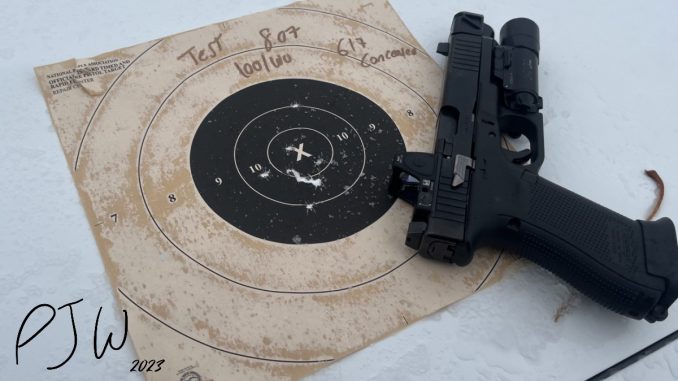
Sometimes, the weather sucks. Shocker, I know. The weather can certainly impact a lot of the outdoor activities we enjoy, like hiking, driving, or shooting. Since moving to Utah, I’ve had to contend with a lot of snow, much more than I was accustomed to on the East Coast. However, I’m not letting it impact my pistol practice regimen, and I’d like to make the case as to why it is important to shoot in bad weather.
Testing Skill In Bad Weather Conditions
For most of us, the square range is where our training and practice are conducted. To try and induce stress and build skill, we modify variables when shooting, but that’s generally done by changing courses of fire. Maybe we do a drill like the FAST, that integrates in a reload, and a strict time limit. Maybe we add in some element of movement, like the 9-In-9 Skill Drill. However, I’d argue that by “modifying” the weather conditions, we can also induce a degree of stress.
Let me paint a picture; I shoot every week, generally each Sunday. I go out at the same time each Sunday, as I can have the land all to myself. Regardless of weather, I go. On Summer days, that means I get to have pleasant weather, and wear light clothing. January 1st, 2023, was on a Sunday, so I went to shoot. It so happened that a winter advisory was in effect, and lots of snow was falling from the sky.
With the inclement weather I had 3 layers over my AIWB carried pistol, making my draw much harder. This naturally occurring variable required me to be extra hard on my skills to perform well. Sure, I could toss extra layers on during a nicer day, but being required to layer up induces another variable to deal with, without artificialities.
All things considered, I shot pretty well on that day. Cold hands certainly made grip worse, which meant I had to devote more effort to doing it well. If I had waited for a warmer day or a dry one, I wouldn’t have stressed the same skills.
Weather itself isn’t the only condition we can modify.
Testing Skill In Varying Light Conditions
In addition to weather, time of day plays a part too. It’s dark half of the day, which is why so many of us focus on white light integration. For those that are at an indoor range, you may be able to shoot with the lights set low, or off to simulate night shooting. I shoot outside, so that means shooting later in the day. Does that suck? Well, Utah, in the Winter, in the night, isn’t exactly pleasant. However, shooting at night is a slightly different skillset to work, so I deal with bad weather.
Flashlights and WMLs are tools that can be exploited to diffuse situations, or allow us to PID/control potential threats. However, we’ve got to practice using them. We can dryfire at home with the lights off, but getting some live fire time is certainly important too. Under dryfire, a certain light technique might seem good, but when you start live fire, it might not be usable.
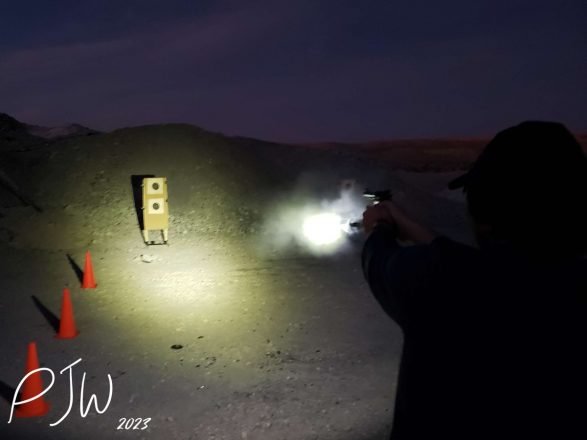
It goes without saying, but you really cannot practice with NVGs during the daytime either. NVGs take getting time to get familiar with, and it’s got to be dark for that to happen. NVG skill is all about familiarity, which is only bred through practice over time.
Can your gear work in daytime and nighttime, hot or cold, humid or dry?
Testing Gear In Bad & Varying Weather Conditions
Aside from testing ourselves, varying weather conditions allow us to test our gear. We can both test how well it holds up to the environment, and how it effects our performance in said environment.
During the HSG Night Fighter class I took in December of 2022, my gear was tested in the cold, snowy environment. Would my optics frost up in the cold? Would my WML bezels also freeze up? How would my thermoplastic holster and magazines fare? Well, I actually tested that in November of the same year.
During that month, I found out that my Safariland holster required some more modification to work with my Glock 17, due to using it at a very cold pistol match. I also found that my Aimpoint T-2 will frost up on the lenses, but only if I kept my lens caps closed. I found that while frosted over, the optic was unusable. Prior to the HSG class, I fixed the holster, and started leaving my T-2 caps open. At the class, I had no issues with either.
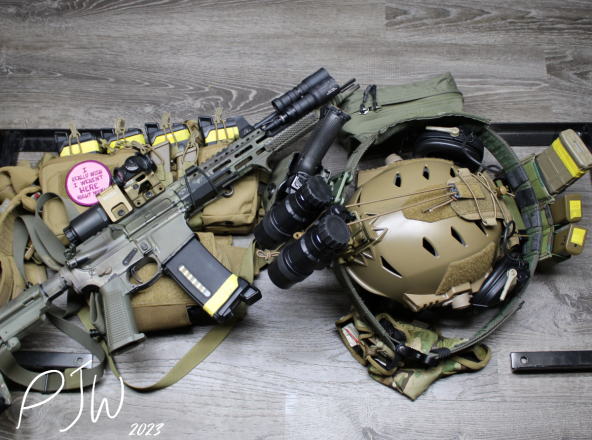
When we test our gear in varying environments, we can see how well it works, or doesn’t work. Cold and hot, dry or humid, our gear will perform differently, and effect our performance differently. The aforementioned issues with my gear would not have happened in a warmer environment, but I don’t live in a warm environment, so it was a good lesson learned. Sometimes, we find our gear to be lacking, when conditions change. Maybe your carbine WML has issues with breaking through rain, and you need more output. It sounds obvious, but you’ve got to test the gear in the environment you’ll be using it in, even when the weather sucks.
We Don’t Get To Pick The Worst Day Of Our Lives
Obviously, we don’t get to pick the day that we may have to employ self defense tools to protect ourselves or our loved ones. However, we can take measures to be more prepared. You may find that some skills are harder to perform under adverse weather conditions, or when the lighting sucks. You may end up like me, and find that an optic frosts up because you were overly cautious. Either way, by training and practicing when the weather or lighting are adverse, we can be better prepared for that “worst day”.


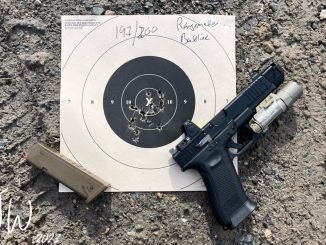

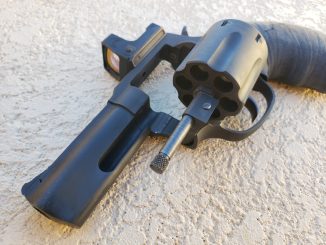
Be the first to comment